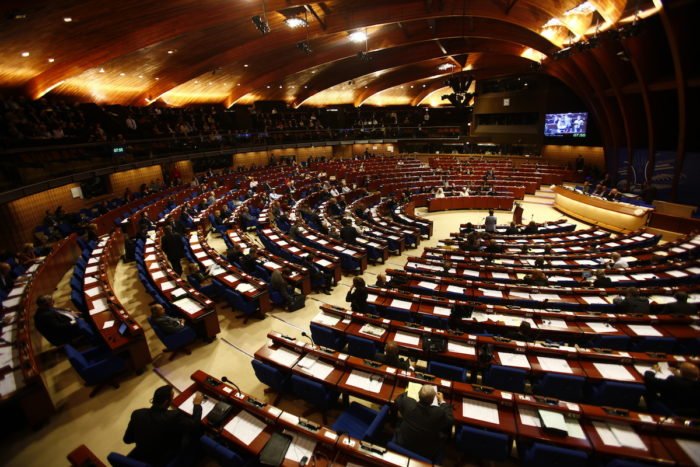The Parliamentary Assembly of the Council of Europe (PACE) has rejected a proposal given by Turkey’s ruling Justice and Development Party (AKP) deputies to use a hoax term of “FETÖ” instead of the phrase of “Gülen movement” in the draft report titled “The functioning of democratic institutions in Turkey” on Tuesday.
The proposal given by AKP deputies Şaban Dişli, Serap Yaşar, Markar Esayan, Salih Fırat, Mehmet Kasım Gülpınar, Emine Nur Günay, Suat Ünal and Burhanettin Uysal and demanded a change in the draft resolution paragraph 13’s first and second sentences to replace the words ‘Gülen movement’ with the ‘FETO/PDY.’ However, PACE has rejected the AKP deputies derogatory proposal.
“FETÖ” is a derogatory term amounts to a hate speech and relentlessly perpetuated by President Erdoğan and his government to smear the Gülen movement which is inspired by the US-based Turkish Muslim intellectual Fethullah Gülen who is one of the vocal critics of Turkish government. Gülen has been outspoken figure in lambasting Turkey’s autocratic President Recep Tayyip Erdoğan on corruption that was exposed in December 2013 as well as Ankara’s aiding and abetting of radical groups in Syria that was uncovered with illegal shipment revelation in January 2014.
Erdoğan launched a witch-hunt persecution against Gülen and his followers and vowed to pursue them abroad no matter where they are. Turkish government shut down all institutions affiliated with the movement and jailed almot 50.000 people in the last nine months alone. He labelled the movement as ‘FETÖ’, a terrorist organization, although Gülen, 75-year old cleric, and his followers have never advocated violence but rather remained staunchly opposed to any violence, radicalism and terror in the name of religion.
Erdoğan has also blamed the failed coup bid last year to Gülen but failed to present any direct evidence linking the cleric to the attempt. Gülen himself strongly denied any involvement. Many believe Erdoğan staged the failed coup himself to set up his critics for a mass persecution and as a pretext to transform secular parliamentary democracy to political Islamist autocracy.
AKP lawmakers have also wanted to drop the word “purges” from highly critical PACE report, but they have also failed to do so. The language of the report has been toughened further by the new amendments that were approved against the wishes of Erdoğanist AKP deputies. At least four amendments by ruling party AKP lawmakers have failed to pass, as strong sentiments against Turkey at PACE were observed.
PACE met on Tuesday to discuss whether to degrade Turkey’s status and reopen a monitoring process against the country. PACE has called for monitoring of Turkey to be reinstated in order to strengthen its cooperation with Turkish authorities and all forces in the country and thus ensure respect for fundamental freedoms, the rule of law and democracy.
The PACE monitoring commission to vote on a draft report titled “The functioning of democratic institutions in Turkey.” Several amendments to the content of the report have been proposed ahead of the April 25 vote by members of the assembly, while Turkey also submitted a number of amendment proposals ahead of the vote.
The co-rapporteurs of the monitoring committee have recommended in a draft resolution that the assembly “re-open the monitoring procedure in respect to Turkey until its concerns are addressed in a satisfactory manner.” In a press release on early March, the monitoring committee had underlined that there has been a “serious deterioration of the functioning of democratic institutions in the country” during a state of emergency declared following a failed coup attempt on July 15 of last year.
In a recent report prepared by PACE rapporteurs Marianne Mikko and Ingebjørg Godskesen, PACE pointed out that the Justice and Development Party (AKP) government had adopted “disproportionate measures” that go beyond what is permitted by the Turkish Constitution and international law, and expressed concern about the extent of the purges conducted in public administration, the military, the judiciary and the teaching profession.
While acknowledging the trauma caused by the failed coup attempt of 15 July 2016 and multiple ongoing terrorist threats, the Monitoring Committee stated that they have concerned about the implementation of the state of emergency, the large-scale and disproportionate effect of the decree laws – including the massive dismissal of civil servants, judges, prosecutors and academics and the closing down of media and NGOs – as well as limited access to judicial remedies.
The Monitoring Committee is also worried about the detention of parliamentarians and journalists, repeated violations of the freedom of expression and of the media and the situation in south-east Turkey, leading to a serious deterioration of the functioning of democratic institutions. The committee has moreover expressed concern about the constitutional amendments (in particular respect for the separation of powers, checks and balances and independence of the judiciary) to secure a presidential system and the conditions of the organisation of the referendum of 16 April 2017.
In the light of these developments, the Monitoring Committee urges Turkey to take urgent measures (including the lifting of the state of emergency and the release of MPs and journalists) and proposes that the Parliamentary Assembly reopen the monitoring procedure so as to intensify its co-operation with the Turkish authorities and all forces in the country.
The PACE report stated that one-quarter of judges and prosecutors, one-tenth of the police force, 30 percent of the staff in the Ministry of Foreign Affairs and 5,000 academics have been dismissed as part of post-coup purges in Turkey.
The committee also expressed alarm at the repeated violations of freedom of the media by the Turkish government and described the situation as “unacceptable in a democratic society” while adding that a large number of journalists currently under arrest and critical journalists were silenced due to government pressure.
On the imprisonment of Kurdish politicians, PACE said the lifting of the immunity of 154 deputies in May 2016 has undermined the functioning of Turkey’s Parliament and affected the opposition parties, in particular the pro-Kurdish Peoples’ Democratic Party (HDP), 93 percent of whose MPs have been stripped of their immunity from prosecution.
In light of the established violations of human rights under the state of emergency, the Monitoring Committee has called on Turkish authorities to take urgent measures and in particular to lift the state of emergency as soon as possible, halt the publication of decree-laws which bypass parliamentary procedure and to release all detained parliamentarians and journalists pending trial, unless convicted.
Meanwhile, Turkey Presidential spokesperson İbrahim Kalın said on Wednesday that PACE’s initiative to degrade Turkey’s status is “openly a political operation” against Turkey. In spite of Turkey’s efforts at cooperation, the Turkish government sees that there are some political initiatives against the country “in some purposeful circles,”
In 2004, the EU said Ankara had to exit the monitoring process in order to meet the Copenhagen criteria. In the same year, the EU provided a date to begin accession negotiations after the monitoring status was lifted, ruling that Turkey had successfully met the Copenhagen criteria. If PACE decides to begin monitoring Turkey once more, it would confirm that Ankara has not fulfilled the Copenhagen Criteria, which was the starting point for the accession negotiations.
The EU Council, which postponed the request to suspend negotiations with Turkey during a summit in December 2016, will review the request at the end of this month if PACE downgrades Turkey’s status.
April 25, 2017















